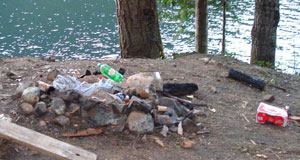 Garbage:
Garbage:Eat or burn left over food, or carry it out with you. Do not bury it near the camp site as this will attract unwelcome wildlife to the site and they will make life unpleasant for future users.
If you bring it in, take it out with you.
Leave nothing behind. If you find garbage from previous inconsiderate campers, if possible, burn it or carry it out.
Remove all non-combustible items such as tin cans, foil wrappers, glass, and plastics, and carry them out with you. Do not burn plastic items.
Many parks have tightened regulations and restricted access because inconsiderate campers have left behind garbage or damaged the bush around camp sites.
Ideally, the only thing you should take out of the bush are memories and the only thing that you should leave are footprints.